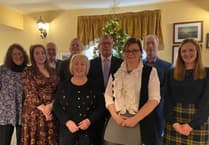Nutrient management planning part-funded by Farming Connect is allowing a Welsh livestock farm to maintain grass and arable yields and reduce reliance on synthetic fertiliser.
Harri Parri and his family farm 293 hectares across three holdings near Pwllheli and on the Llŷn Peninsula.
They run a suckler beef herd of Stabilisers, a flock of Lleyn and Lleyn x New Zealand Suffolk ewes and 32,000 free range laying hens.
In 2021 the business was awarded funding by the Farming Connect Advisory Service to partially pay for a nutrient management plan.
This was used to inform decision making on appropriate nutrient applications for fields.
Targeting those application and better managing farmyard manure and chicken muck has since allowed the business to halve its volume of purchased fertiliser.
“We have an abundance of potash and phosphate from the poultry and by soil testing and nutrient management planning we are able to better utilise it which means we don’t need to buy chemical potash and phosphate, only nitrogen or urea,’’ Harri explained.
“We have reduced input costs and still maintain yield in our crops off the land as well.’’
Forty hectares of barley, oats and fodder beet are grown in a four or five-year rotation to reduce the risk to the business against high feed prices.
The majority of the arable crops are grown with minimal bagged nitrogen.
Running a mixed farming enterprise builds resilience in the soil, allowing yields of more than 3t/acre to be captured from barley without this purchased input.
The majority of fields have P and K indexes of 2 or 3 and pH across the farm averages 6.1.
Soil testing guides the business on the nutrient needs of fields, to inform decision making on where manure needs to be targeted.
For the last six years Harri has used prilled lime instead of conventional lime to raise soil pH levels after attending a Farming Connect open day where this approach was discussed.
He says open days like these are very useful for gaining knowledge on new ideas or reinforcing existing practices.
“I pick up snippets at these events and at the Farming Connect beef and sheep and poultry discussion groups that I am a member of.’’
These discussion groups meet four or five times a year, facilitated by the local development officer.
“As a beef and sheep group we were keen to introduce a business element and there was the flexibility to do this and broaden our range of speakers,’’ said Harri.
When the family established the free range egg business, they had little knowledge of poultry so being part of a discussion group has been a help.
The business employs two full-time workers and seven part-timers across all the enterprises, with Harri and his father working full time in the business too.
Ensuring that everyone has the right skills training is a priority.
“Farming Connect skills and training support has been integral to ensure we acquire the key skills and competencies we need to meet our personal, business and technical objectives,” he added.

.jpeg?width=209&height=140&crop=209:145,smart&quality=75)


